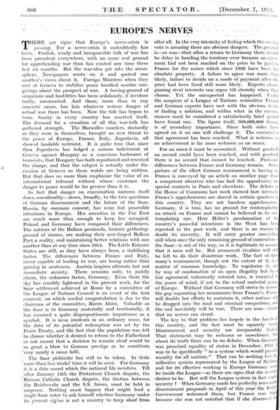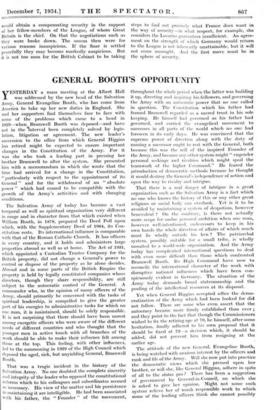EUROPE'S NERVES T HERE are signs that Europe's nerve-crisis Is passing.
For -a nerve-crisis it undoubtedly has been. Foolish, windy and irresponsible talk of war has been prevalent everywhere, with no more real ground for apprehending war than has existed any time these last six months. But the war-idea got into the atmo- sphere. Newspapers wrote on it and quoted one another's views about it. Foreign Ministers when they met at Geneva to stabilize peace bandied sombre mis- givings about the prospect of war. A forcing-ground of suspicions and hostilities has been sedulously, if involun- tarily, constructed. And there, more than in any concrete cause, has lain whatever serious danger of Actual war there has been. Now the tide has begun to turn. Sanity in every country has asserted itself. The demand for a -cessation of all this war-talk has gathered strength. The Marseilles murders, dastardly as they were in themselves, brought no new threat to the peace of Europe. France, Italy, Jugoslavia, all showed laudable restraint. It is quite true that since then Jugoslavia has lodged • a serious indictment at Geneva against Hungary.-as a conscious harbourer .of terrorists, that Hungary has both repudiated and resented the charge, and that the subject is actually under dis- cussion at Geneva as these words are being written. But that does no more than emphasize the value of an international tribunal without whose existence the danger to peace would be far greater than it is.
In fact that danger on examination narrows itself down considerably—down, broadly, to the two questions of German disarmament and the future of the Saar. Russia, by common consent, has none but peaceable intentions in. Europe. Her anxieties in the Far East are much more than enough to keep her occupied. Poland and Germany have composed their differences. The nations of the Balkan peninsula, historic gathering- ground of storms, are making their new-forged Balkan Pact a reality, and maintaining better relations with one another than at any time since 1914. The Little Entente States are still, as they have always been, a stabilizing factor. The differences between France and Italy, never capable of leading to war, are losing rather than gaining in acuteness. Austria inspires ultimate but not immediate anxiety. There remains only, to justify alarm, the unknown factor, Germany. Even there the sky has sensibly lightened in, the present week, for 'the Saar settlement achieved at Rome by a committee of the League, of Nations Council is an event of the first moment, on which cordial congratulation is due to the chairman of the committee, Baron Aloisi. Valuable as the Saar is to Germany materially and territorially, it has assumed a quite disproportionate importance as a symbol. It is terra irredenta in no ordinary sense, for the date of its potential redemption was set by- the Peace Treaty, and tge fact that the population 'was left to choose whether it desired to return to the Fatherland or not meant that a decision to remain aloof would-be so great a blow to German prestige as to constitute 'very nearly a 'cams belli. . . The Saar plebiscite has' still to be • taken. In little more than five veeks' time it will be over. For Germany it is a date round which the national life revolves. Till after January 13th the -Protestant Church dispute, the [Roman Catholic Church dispute, the friction between the ReiChswehr and "the S.S. forces, must be held in suspense. Nothing must happen that might -lead a ' single Saar voter to ask himself whether Germany under its present regime is not a country• to 'keep aloof from after 'all. In the very intensity of •feeling nwhich the comina vote is arousing there are obvions dangers. -The greatest is—or wasthat after a return' to Germany there should be delay in handing the territory over because an agree- ment had not been reached on the price to be paid to France for the mines which since 1920 have been her absolute property. A failure to agree was more than likely, failure to decide an a mode of payment after the price had been fixed still more likely. Experts cham- pioning rival interests can argue till eternity when they choose. Yet the unexpected has happened. Under the auspices of a League of Nations committee French and German. experts have met with the obvious desire of finding a solution, and within what in the cireuni- stances must be considered a satisfactorily brief period have found one. The figure itself, 900,000,000 francs, is of secondary importance. Since both sides have agreed on it no one will challenge it. The essential is that agreement has been reached. What is welcome as an achievement is far more welcome as an omen: For an omen it must be accounted. Without goodwill no accord could have been reached, and with goodwill there is no accord that -Cannot be 'reached. Profound differences between France and Germany remain. Sonic picture of tile effect German rearmament is having on France is conveyed by an article on another page from a competent observer who has had the opportunity for special contacts in Paris and elsewhere. The debate in the House of Commons last week showed how intensely France's apprehensions are shared in certain quarters in this country. They are not baseless apprehensions. Germany, it is true, has no ground for contemplating an attack on 'France and cannot be believed to be con- templating one. Herr Hitler's proclamation of his Country's peaceful intentions in the West has been repeated in the past week, and there is no reason to doubt its sincerity. It will carry greater conviction still when once the only remaining ground of contention– the Saar—is out of the way, as it is legitimate to assume that it soon will be. But armament rivalries will still 'be left to do their disastrous work. The fact of Ger- many's rearmament, though not the extent of it, is a matter of common knowledge. To regularize it, not by way Of condonation of an open illegality but by a fair agreement voluntarily entered into, is essential to the peace of mind, if not to the actual material peace, of Europe. Without that Germany will strive to narrow the gap separating -her armaments from France's, France will double her efforts to maintain it, 'Other nations will be dragged into the mad and criminal- competition, and the end inevitably will be war. -There are 'some strains that no nerves -can stand..
The key to that problem; lies largely in the hands of this country, and the • fact must be -squarely facet'. 'Disiiinament and security 'are inseparably linked. That statement may. be -welcome or unwelcome, but 'about its truth there-can be• no debate: When Germany was promised equality of status in December, 193g. it was to be specifically " in-n system which "would provide security for 'all-nations." That can be -nothing -but the collective system represented by the League of Nations, - and -for:its -effective working in Europe Germany most ' be-inside the-League—as there are signs.that she secretly ' desires. to be: .But:will- the League system in fact confer -security ? • When Germany--made her perfectly.reasonabl disarmament proposals .in April of this • year the British -Government. welcomed -them; but . France was frig • because she was not satisfied that if she disarmed s would obtain a compensating security in the support of her fellow-members of the League, of whom Great Britain is the chief. On that the negotiations such as they were broke down. The omens then were for various reasons inauspicious. If the Saar is settled peacefully they may become markedly auspicious. But it is not too soon for the British Cabinet to be taking steps to find out precisely what France does want in the way of security—in what respect, for example, she considers the Locarno guarantees insufficient. An agree- ment on the strength of which Germany would return to the League is not inherently unattainable, but it will not come unsought. And the first move must be in the sphere of security.



















































 Previous page
Previous page